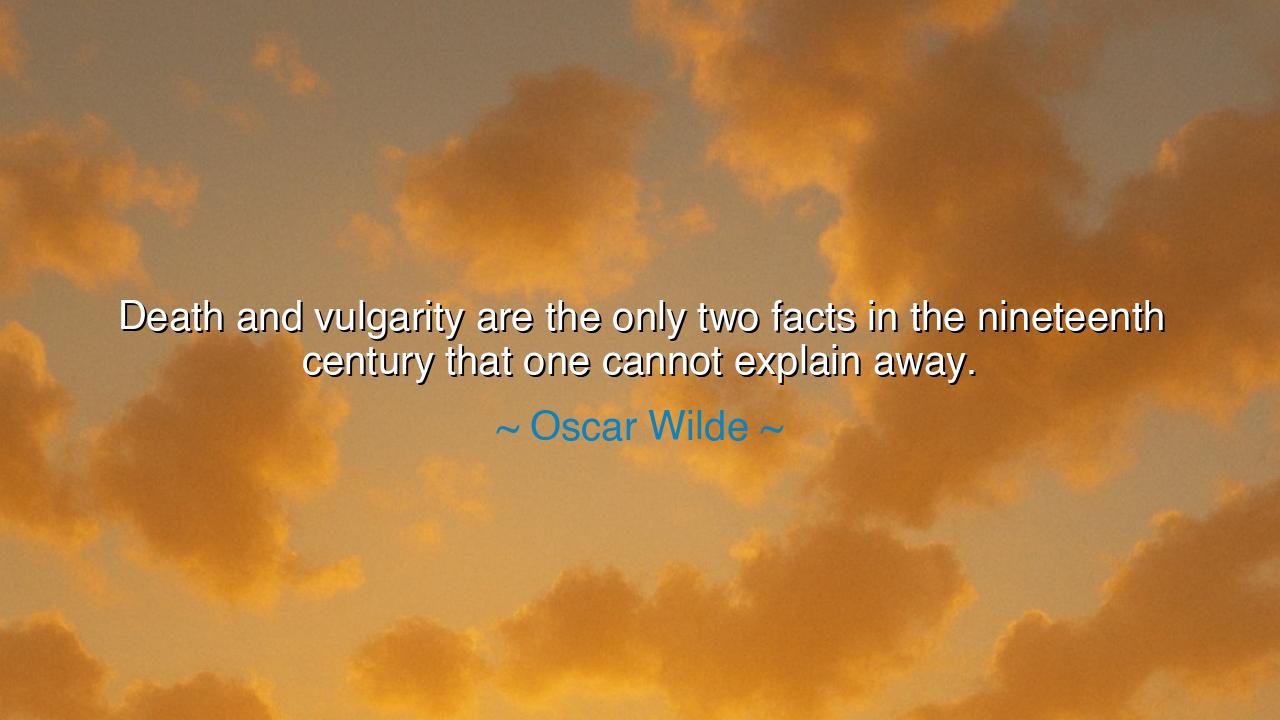
Death and vulgarity are the only two facts in the nineteenth
Death and vulgarity are the only two facts in the nineteenth century that one cannot explain away.






“Death and vulgarity are the only two facts in the nineteenth century that one cannot explain away.” — thus wrote Oscar Wilde, the poet and prophet of beauty, whose wit could wound and heal in the same breath. In these words, cloaked in irony and brilliance, Wilde delivers not merely a quip, but a judgment upon his age — an age of progress and pride, yet one haunted by hypocrisy. His statement is both a lament and a revelation: that in a world intoxicated with appearances, with invention, with refinement and moral posturing, two things remained stubbornly unrefined, unpretentious, and unavoidable — death, the great leveler of all men, and vulgarity, the mark of the soul’s emptiness.
To explain away is to deny, to justify, to smooth the rough edges of reality until only comfort remains. The nineteenth century, with its faith in science, industry, and rational thought, sought to explain everything — from the stars to the soul, from heaven to the grave. But Wilde, ever the truth-teller wrapped in silk and laughter, pierced this illusion. No matter how far the century advanced, it could not rid itself of two truths that mocked its sophistication: the inevitability of death, and the persistence of vulgarity — that coarseness of spirit, that spiritual ugliness born of greed, hypocrisy, and shallowness. Beneath the veneer of civilization, he saw both the corpse and the commonness that no intellect could disguise.
To understand this, we must see Wilde as he was: a man of paradox. He adored beauty, art, and elegance, yet his vision of humanity was unflinchingly honest. He knew that beneath the silks of society lay decay, and beneath its refinement lay vulgar ambition. The Victorian age, with its strict manners and moral masks, despised vulgarity because it revealed what society wished to hide — the hunger for wealth, for status, for control. Yet the more it tried to hide these impulses, the more they festered. Wilde’s genius was to expose this contradiction: that the age which prided itself on culture was, in truth, terrified of its own baseness. And so, he says, “vulgarity” — not the mere lack of taste, but the poverty of the soul — cannot be explained away. It clings to civilization like shadow to light.
And as for death, it too resists explanation. The century of science could dissect the body, but not the mystery of its departure. The priests spoke of heaven, the philosophers of nothingness, yet neither could soothe the fear that death inspired. In his observation, Wilde reminds us that death and vulgarity are twin mirrors of human limitation. One reveals the truth of our mortality, the other the truth of our moral weakness. No progress can erase them. They stand as reminders that beneath all our striving, we remain fragile, foolish, and finite.
The ancients, unlike Wilde’s contemporaries, did not seek to escape these truths. The Stoics faced death daily in their meditations, calling it the natural fulfillment of life. The Greeks, in their dramas, made vulgarity — hubris, lust, greed — the instruments of tragedy, not things to be hidden but to be confronted. But the modern man, Wilde observed, preferred denial. He painted the corpse and called it youth; he gilded his vices and called them virtues. The nineteenth century, in its glory and grandeur, tried to bury both death and vulgarity beneath its inventions — but they remained, incorruptible, mocking every pretense.
Consider the fall of Charles Baudelaire, Wilde’s spiritual kin, whose Les Fleurs du mal was condemned for its obscenity. Baudelaire dared to write what others only whispered — that beneath the perfume of beauty there is rot, beneath desire there is decay. Like Wilde, he saw that the refined surface of civilization hid something primal and dark. Both men were punished for telling the truth — Wilde with prison, Baudelaire with scorn. Yet both knew that the artist’s task is not to flee vulgarity, but to transform it, to confront death and ugliness and wrest beauty from their grasp.
And so, my child, let this be the lesson: beware the illusion of perfection. No age, no nation, no person can explain away death or vulgarity, for they are woven into the fabric of existence. Death reminds us that all things pass; vulgarity reminds us that not all things rise above their basest nature. But do not despair. For to acknowledge these truths is not to be defeated, but to be free. When you no longer hide from death, you begin to live deeply. When you recognize vulgarity — in the world and in yourself — you may choose refinement of spirit over vanity of form.
As Oscar Wilde teaches, beauty is not denial of decay, but the courage to create meaning amid it. To live beautifully is to face both death and vulgarity without flinching — to accept that the world’s imperfections are what make art, compassion, and love possible. Therefore, live not to escape truth, but to ennoble it. Seek not to explain away the dark, but to bring light into it. For when you do, you shall see, as Wilde did, that even among the vulgar and the dying, the spirit of beauty — the immortal flame of the human soul — endures.






AAdministratorAdministrator
Welcome, honored guests. Please leave a comment, we will respond soon